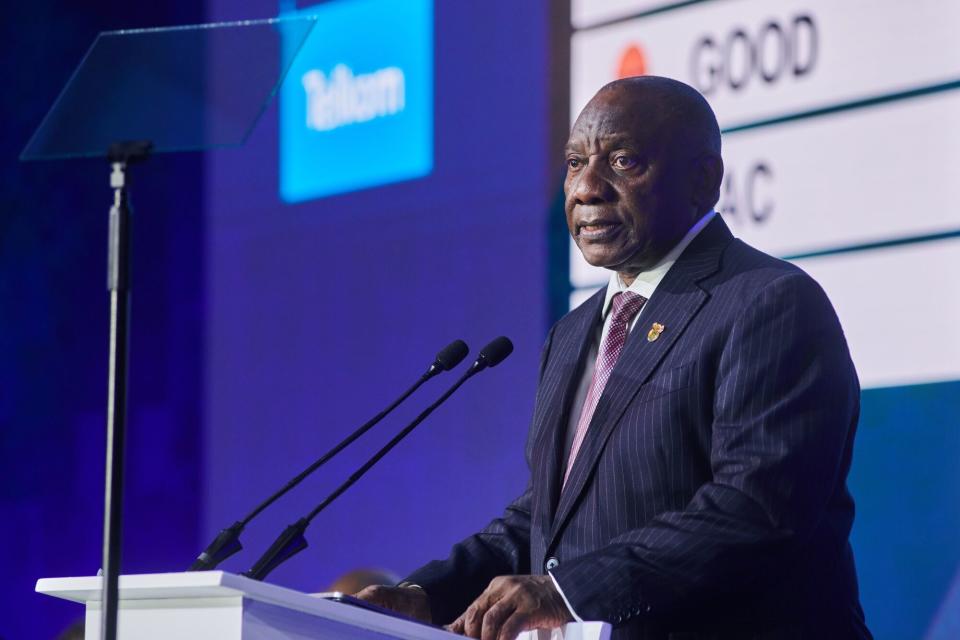South Africa’s ANC Has to Navigate Minefield to Retain Power
(Bloomberg) -- South Africa’s African National Congress suffered a historic rebuke in last week’s elections, losing its parliamentary majority for the first time since it took power when apartheid ended in 1994. Now, with just 40.2% of the vote, it’s forced to seek out an alliance or coalition — likely with its biggest political rival. The horse trading has just begun.
Most Read from Bloomberg
Short Sellers in Danger of Extinction After Crushing Stock Gains
Mnuchin Chases Wall Street Glory With His War Chest of Foreign Money
How Billionaires Bought 70% of Detroit’s Offices and Transformed the City
NYSE Fixes Issue That Showed 99% Drops, Triggered Trading Halts
Here’s how things are playing out:
1. The state of coalition talks
The ANC’s national working committee will meet on Tuesday to adopt its formal approach to coalitions. So far, unsanctioned inter-party talks have been held to suss out what the key players expect from a tie up. The ANC’s top officials have vowed to speak to everyone, but say they won’t be strong-armed into accepting what they term unreasonable demands, including that President Cyril Ramaphosa be replaced. Later this week, the party will decide on power-sharing proposals to present to its rivals. A final decision on the makeup of the new government is expected in the following few days.
2. The ANC’s potential partners
Right now, it appears the ANC will most likely ally with the Democratic Alliance, which came second in the election with 21.8% support, although the situation remains very fluid. The DA’s predominantly White leadership — and a reputation as the party of the rich and White that it’s trying to shed — puts a ceiling on its national support, given the country’s predominantly Black population and ugly history of institutional racism. Formed in 2000, the business-friendly party has long been the ANC’s principle political antagonist, but it’s also the match best liked by investors — a community Ramaphosa has long courted.
The Inkatha Freedom Party — which got 3.9% of the vote and is the third-largest party in the crucial province of KwaZulu-Natal — is likely to come along for the ride, along with one or two smaller parties so the ANC can present its coalition as a national unity government.
The least palatable options to Ramaphosa’s centrist faction of the ANC and the markets are the leftist Economic Freedom Fighters and former President Jacob Zuma’s uMkhonto weSizwe Party (MKP) — which won 14.6% of the vote in its inaugural election. But it might appeal to the ANC’s rank and file — the EFF and MKP are breakaways from the major party, meaning some of their members and supporters have a shared sense of identity.
Read more: South Africa Can Avoid a Doomsday New Government: Justice Malala
3. How they’re likely to divvy up power
The most likely scenario is a so-called “confidence-and-supply” agreement with the DA et al, which would see the ANC retain control of the executive — including the presidency and important ministries like finance and state security — unopposed by the rest. In exchange, the ANC would relinquish control of key positions in the legislature to the DA, while smaller parties would get a seat or two in the cabinet. Ramaphosa would be likely to stay on as president in this scenario, despite his party’s dismal showing. Such a deal would protect the ANC from motions of no confidence by the likes of the MKP and EFF, and provide some level of stability.
4. The role of KwaZulu-Natal
In a surprising result, Zuma’s MKP swept the ANC from power in the country’s second-most populous province, winning 45% of the vote and ensuring it a place on the national stage. The politically volatile region suffered an undeclared civil war in the 1980s and 1990s that was fueled by the apartheid regime and claimed thousands of lives. A large contingent of ANC councilors, who have covertly defected to the MKP, have warned that they will resign should their party opt for a coalition with the DA. If they do, the ANC could lose control of the province for a generation, and be thrown into hundreds of distracting by-elections just as they’re trying to get a national coalition off the ground.
5. The role of Gauteng
South Africa’s economic hub and most populous province is home to two major cities that paint a picture of how power sharing could pan out in the rest of country, and it doesn’t look great. Johannesburg and Ekurhuleni are both run by chaotic coalitions between the ANC and the EFF, and the delivery of water and many basic services has ground to a near halt in some areas. Any national agreement between the ANC and other partners — like the DA and IFP — would cause this deal to collapse, a move that could push the ANC executive committee in the province to join calls to unseat Ramaphosa for abandoning a like-minded Black party in favor of one that opposes their quest to address apartheid’s legacy of racial inequality. They’re already lining up to oppose a deal with the DA. It will be all but impossible for the ANC to strike a national deal with the DA without triggering mass resignations, defections and the collapse of municipal coalitions in Gauteng, making the national calculus that much more difficult.
Sign up here for the twice-weekly Next Africa newsletter.
Most Read from Bloomberg Businessweek
The Budget Geeks Who Helped Solve an American Economic Puzzle
Startup Brings New Hope to the Pursuit of Reviving Frozen Bodies
Disney Is Banking On Sequels to Help Get Pixar Back on Track
How Rage, Boredom and WallStreetBets Created a New Generation of Young American Traders
©2024 Bloomberg L.P.

 Yahoo News
Yahoo News 



